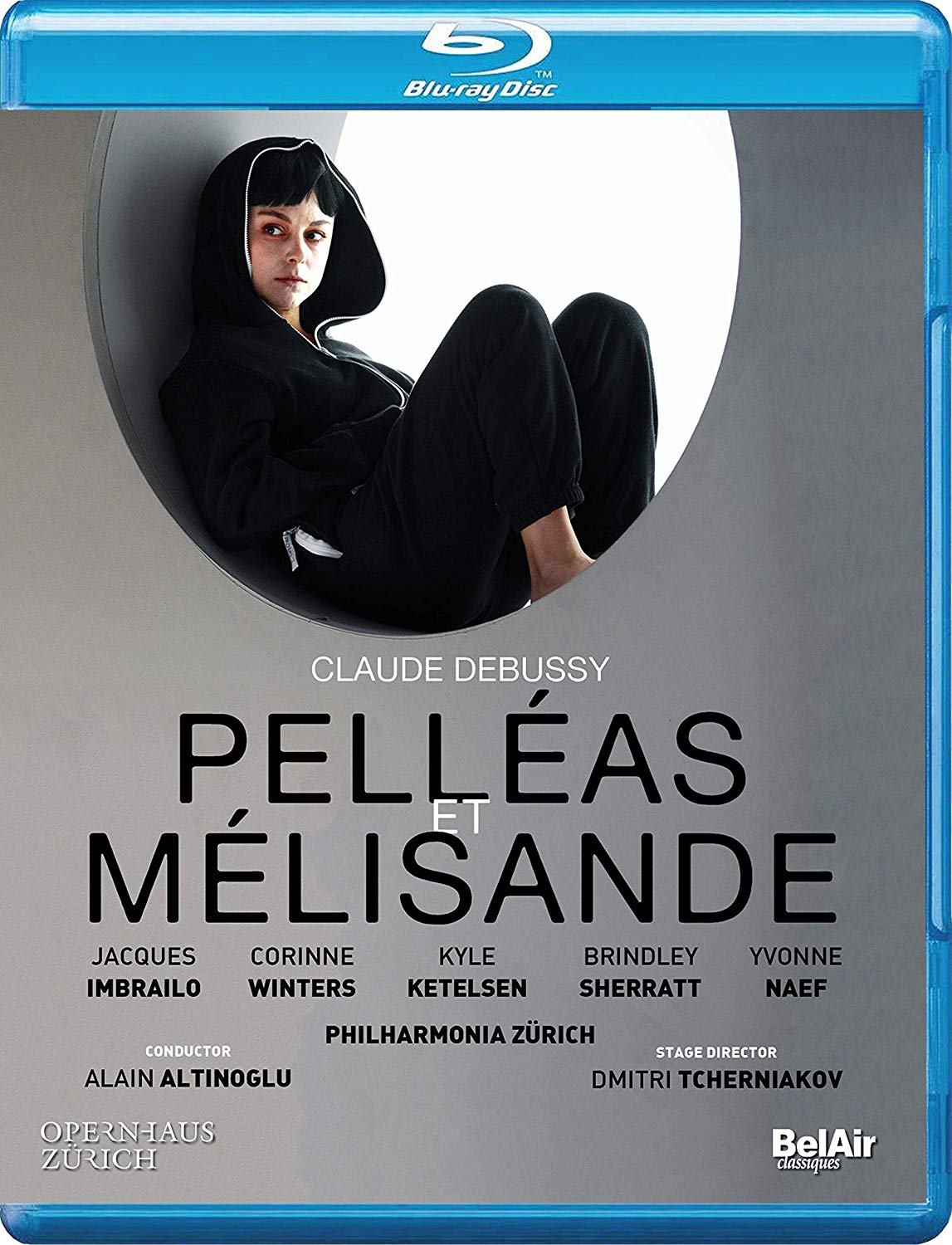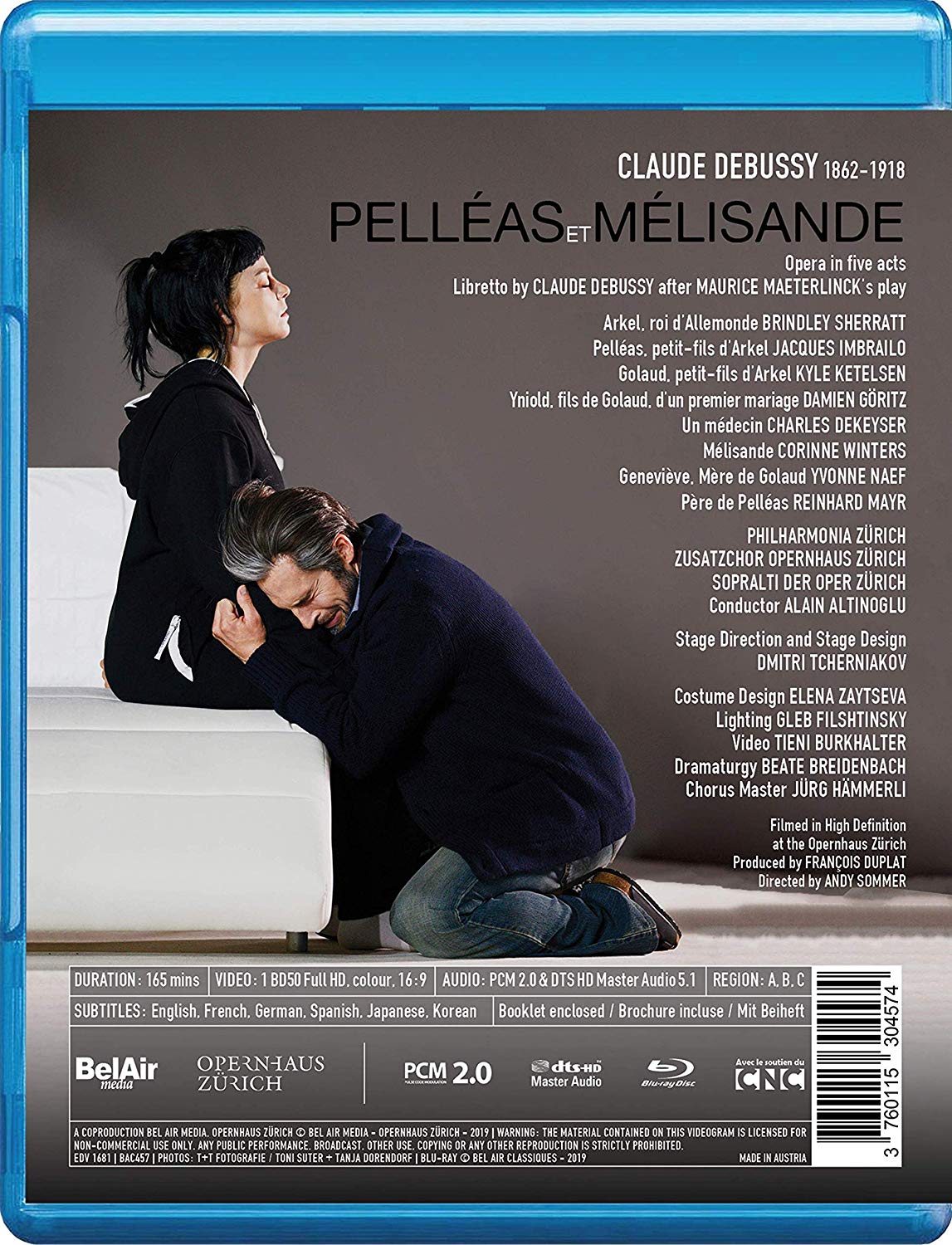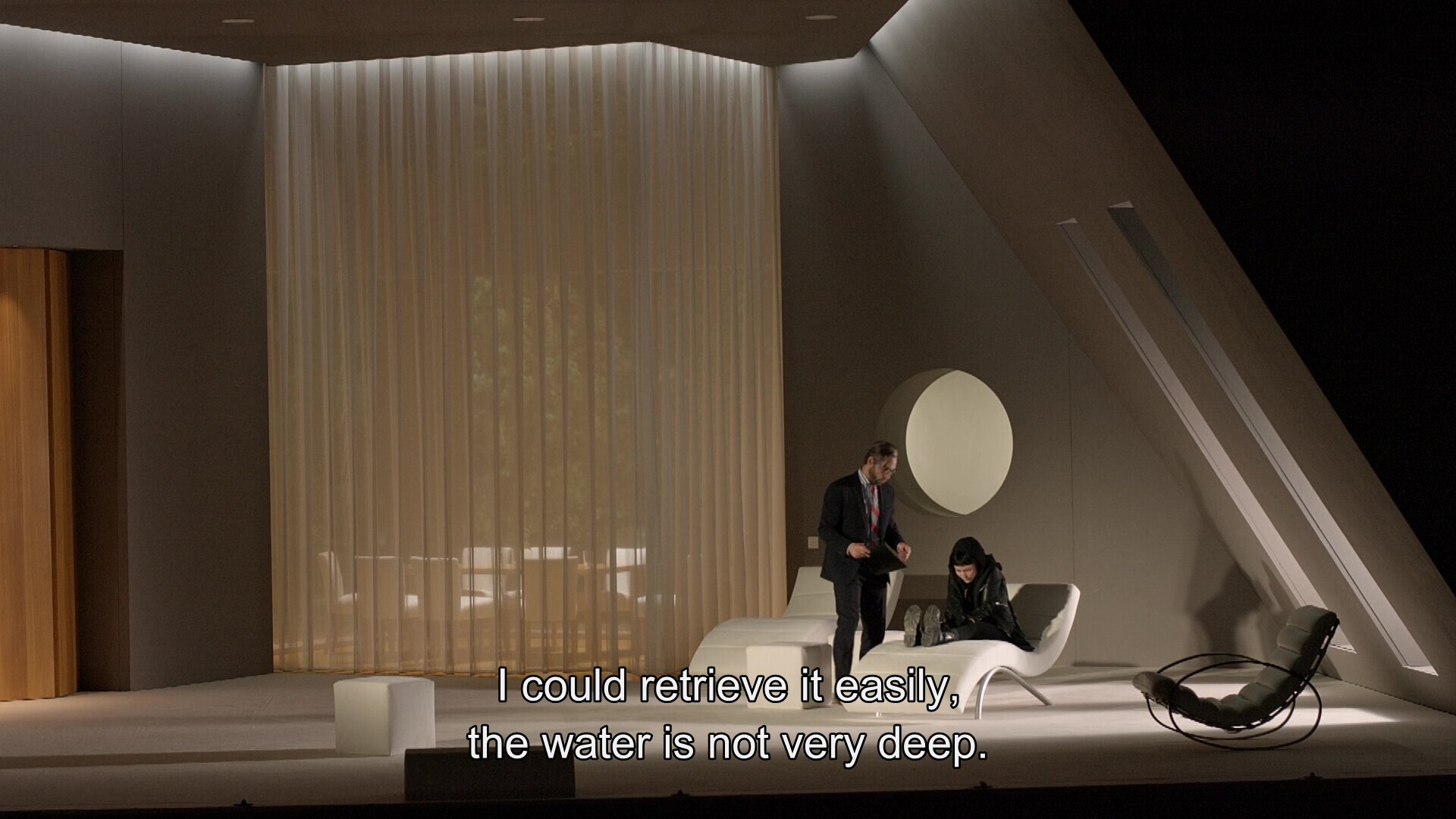

Debussy Pelléas et Mélisande opera to libretto by the composer after the play by Maurice Maeterlinck. Directed 2016 by Dmitri Tcherniakov at the Opernhaus Zürich. Stars Brindley Sherratt (Arkel), Jacques Imbrailo (Pelléas), Kyle Ketelsen (Golaud), Damien Göritz (Yniold), Charles Dekeyser (A doctor), Corrine Winters (Mélisande), Yvonne Naef (Geneviève), and Reinhard Mayr (Pelléas’s Father). Alain Altinoglu conducts the Philharmonia Zürich, Zusatzchor Opernhaus Zürich, and the Sopralti Der Oper Zürich (Chorus Master Jürg Hämmerli). (The “Sopralti” is an all female choir of sopranos and altos.) Set design by Dmitri Tcherniakov; costume design by Elena Zaytseva; lighting design by Gleb Filshtinksy; video design by Tieni Burkhalter; dramaturgy by Beate Breidenbach. Directed for TV by Andy Sommer; produced by François Duplat. Sung in French. Released 2019, disc has 5.1 dts-HD Master Audio sound. Grade: F+
NB: Go to our story on the Essener Philharmoniker version of Pelléas et Mélisande for extensive background on the opera and a genealogy of the Arkel royal family.
Dmitri Tcherniakov is a Russian opera director famous for his technique of updating operas by carefully preserving their librettos and music while making changes in staging that alter the operas in surprising ways. One of his greatest Blu-ray successes is his astonishingly effective reworking of the Rimsky-Korsakov The Tsar's Bride. His greatest debacle was his savage assault on the revered Dialogue of the carmélites (at the Bayerische Staatsoper) — a prank that even got Dmitri into litigation with the legal successors of the estate of composer Francis Poulenc!
I suspect that the Zürich opera got into a jam when they scheduled Pelléas et Mélisande, which calls for something like 10 set changes, only to discover later that the budget available could pay for but a single set. So they sent Tcherniakov the following email, “Can you do Pelléas et Mélisande on one set.” Answer, “Yes!” Well, Tcherniakov performed and no doubt honestly earned and collected his fee. The only problem is the result was utterly ridiculous.
Pelléas et Melisande takes place on and around the ancient decaying castle Allemonde (an invented word meaning “all the world”). In our first screenshot below, Tcherniakow transposes Allemonde to a slick, compact apartment with a modern, open living room connected to a small dining area. Even for royalty, this is today’s world. And all the events of Debussy’s mythical symbolist creation will take place right there!
Mélisande (Corinne Winters) is downsized from a symbol of the all-that-is-female to something we can more easily grasp: she looks like a teenage drug addict who has just been picked up by the local sex-trafficker at the bus station. And Golaud (Kyle Ketelsen) is not a prince — he’s a psychiatrist. He met Mélisande as a patient at a clinic, married her, and has taken her home. Never mind that all this would be unethical — maybe even criminal — in the real world.
Now in the libretto, Golaud first encounters Mélisande after getting lost hunting for game in a vast forest. And so the first verse sung in the opera is faithfully rendered below. The question is, of course: where’s the forest? I guess we are asked to figure out that the forest is the thicket of Mélisande’s mind:
Golaud made (probably illegal) videos of his patient which are available for anyone in the castle to view:
We are back now below to the opening scene where Golaud finds Mélisande in the forest at a spring. This whole opera drips with water images, but our apartment doesn’t even have a wet-bar. In the libretto, Mélisande has dropped her royal crown in the spring. Golaud offers to retrieve it, but Mélisande doesn’t want it back. If you were a newcomer to this opera, you would by now be off to a very confused start:
In the context of our single slick set, Golaud’s comment below is senseless:
Tcherniakov skips over the first meeting of Mélisande and Pelléas. But soon the two youngsters visit Pelléas’s (Jacques Imbrailo) favorite spot — the Well of the Blind — where Mélisande drops her wedding ring into the water. But it’s kind of hard to lose your wedding ring in a living room with a nice wool wall-to-wall carpet!
And next below the living room has become Golaud’s bedroom. He was thrown by his horse at the same time Mélisande lost the wedding ring, and Golaud is recovering from some injuries. At this point, folks in the live audience were probably starting to day-dream of leaving at the intermission:
You may recall that Mélisande and Pelléas visit a grotto by the sea pretending to look for the lost ring. They are already guilty of conspiring behind Golaud’s back since they well know they lost the ring at the Well of the Blind. So now the living room becomes the cave:
And next the living room becomes the famous tower where Mélisande lets down her long hair (cut short in this production):
One nice thing: in this show Golaud doesn’t have to sneak around in the forest spying on the young lovers-would-be. He just opens a door:
In the libretto, Pelléas ties Mélisande’s hair to branches of a tree, and the line below makes sense. But the line doesn’t make sense when there is no tree:
Another difficult scene to stage is the visit to the castle’s underground sewage system. But why can’t the living room also serve as a septic tank?
Now Golaud is going mad with anguish. He debases himself by recruiting his son Yniold (Damien Göritz) to snitch on his wife and brother. Here from the living room Golaud seems to be relying on ESP:
Mélisande is showing pregnant and Tcherniakov gives her a wardrobe upgrade to a hideous black and white nightgown. Poor Elena Zaytseva must have been crushed when they insisted on blaming her for the costumes in this show:
Tcherniakov promised to stage all of the libretto on one set and he lives up to his word. He even includes the scenes that most everyone else cuts like Yniold (Damien Göritz) playing with his golden ball and the mysterious shepherd and his flock. As a special bonus, Tcherniakov even puts the (unnamed) father of Pelléas (Reinhard Mayr) on stage even though he is not in the libretto. (If the Dallas Opera ever produces Pelléas et Mélisande, I will audition for this part.)
At the end passions run so high that Mélisande gets a nosebleed. But Goloud’s slaying of his brother is not shown by Tcherniakov:
Nor does the libretto call for Yniold to play with his step-mother’s corpse while wearing her nightgown:
If you have been foolish enough to read this far, you will have noted my increasing exasperation in writing his. I’ve racked my soul trying to come up with a justification of what Tcherniakov did here. It seems he tore down castle AlIemonde to its foundation, but built nothing new to replace it. If you can enlighten me, I’ll rewrite.
To be fair, it’s been said that no matter how wild Tcherniakov gets in a production, he has the ability to convince his singers to take him seriously and pour their hearts into his concepts. I didn’t get the feeling from this disc, however, that the singing actors were on board — I think they knew this show would be a loser. Finally, I’m so distracted by this that I can’t remember a thing about the music.
Alas, I have to give this a grade: F+. The F is for the Zürich opera and Tcherniakov. The + is for Andy Sommer’s nice video file.
Here’s a clip from BelAir:
OR
















